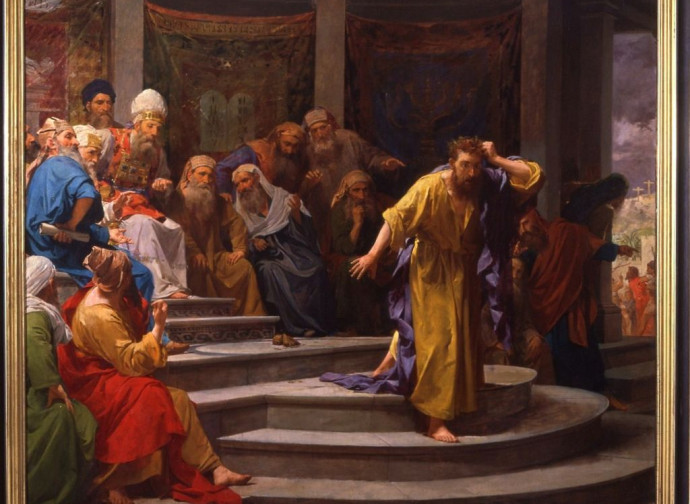Judas and the desperation for salvation
We continue our Lenten journey with Father Cornelio a Lapide's (1567-1637) commentary on the Passion of Christ according to the Gospel of Saint Matthew. It is the moment of Judas' betrayal, of his tortuous repentance, which drives him to despair instead of asking Jesus for forgiveness.

This is the second text (here the first) taken from the Commentary of Father Cornelio a Lapide (1567-1637), Jesuit and exegete, on the Passion of Christ according to the Gospel of Saint Matthew. (Edited by Father Konrad zu Löwenstein).
Verse 3, 4. Then Judas, which had betrayed Him, when he saw that he was condemned, &c. Judas, when he sold Christ, did not expect that He would be killed, but merely seized, and either render them some satisfaction, or in some way escape, as before, out of their hands. But on finding Him condemned to death, he felt the gravity of his sin. And repenting, when too late, of what he had done, he was self condemned, and hanged himself. “The devil is so cunning,” says St. John Chrysostom, ‘that he allows not a man (unless very watchful) to see beforehand the greatness of his sin, lest he should repent and shrink from it. But as soon as a sin is fully completed, he allows him to see it, and thus overwhelms him with sorrow and drives him to despair. Judas was unmoved by Christ’s many warnings; but when the deed had been wrought, he was brought to useless and unavailing repentance.”
That He was condemned. By Caiaphas, i.e., and the whole Council, and that He would shortly be condemned by Pilate on their authority, and by their urgent importunity.
Repented. Not with true and genuine repentance, for this includes the hope of pardon, which Judas had not; but with a forced, torturing, and despairing repentance, the fruit of an evil and remorseful conscience, like the torments of the lost. In Gr. μεταμεληθείς.
Brought again the thirty pieces or silver to the Chief Priests. To rescind his bargain. As if he had said, “I give back the money; do ye, on your part, restore Jesus to liberty.” So St. Ambrose (in Luc. xxii.): “In pecuniary causes, when the money is paid back, justice is satisfied.” …And “Though the traitor was not absolved himself, yet was the impudence of the Jews exposed; for though put to shame by the confession of the traitor, they insisted wickedly on the fulfilment of the bargain.”
I have sinned in that I have betrayed the innocent Blood; for what more innocent than the immaculate Lamb? what purer than the purity of Jesus Christ?
But they said, What is that to us? see thou to that. Carry out what thou hast begun. Bear the punishment of the guilt thou ownest. We own no fault in ourselves. But He is guilty of death as a false Christ, and therefore we insist on it. Now, as they refused to take back the money, Judas cast it down in the Temple, and hung himself, despairing of the life of Jesus and of his own salvation. For assuredly he would not have thus acted had the Chief Priests taken the money back and set Jesus free. Up to a certain point, then, his repentance was right, but when it drove him to despair it was wrong. “See how unwilling they were,” says St. John Chrysostom, “to see the audacity of their conduct, which greatly aggravated their fault. For it was a clear proof that they were hurried away by audacious injustice, and would not desist from their evil designs, foolishly hiding themselves the while under a cloak of pretended ignorance.”
And he cast down the pieces of silver in the Temple, and departed, and went and hanged himself. He first took them to the house of Caiaphas, or certainly to that of Pilate, where the Chief Priests were prosecuting their case; and afterwards, on their refusing to take them, threw them down in the Temple for the Priests to pick up. Some of the Chief Priests were probably there, but anyhow by throwing them down in the Temple he dedicated them, as the price of the Most Holy Blood, to sacred and pious uses, if the Priests refused to take them back.
And he went and hanged himself. … Judas then added to his former sin the further sin of despair. … He might, on his repentance, have asked (and surely have obtained) pardon of Christ. But… he could not bear the heavy remorse of an accusing conscience. …David had prophesied respecting him, “Let a sudden destruction,” &c. (Ps. xxxv).


